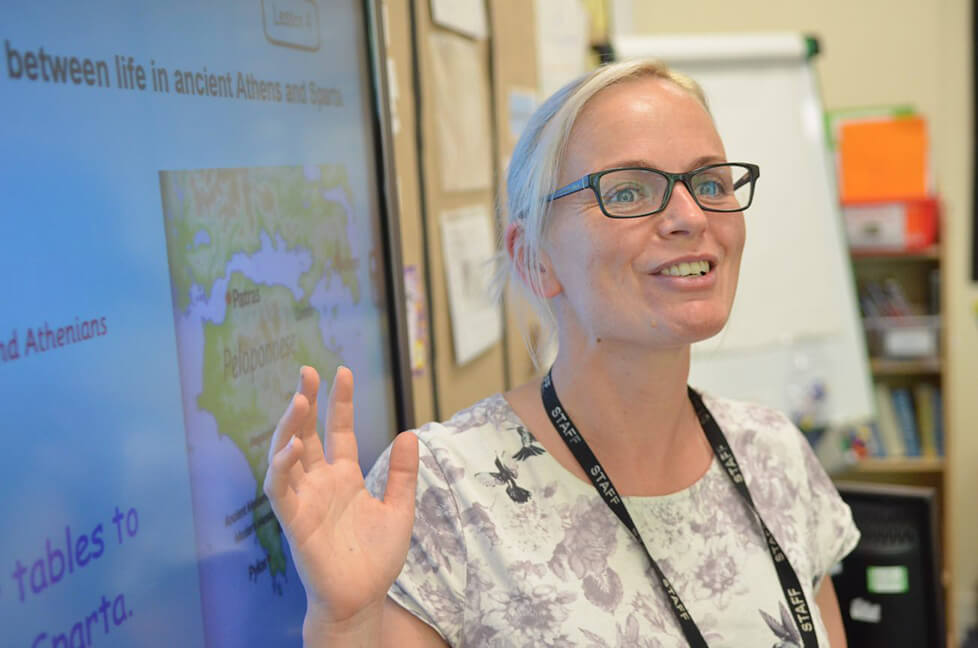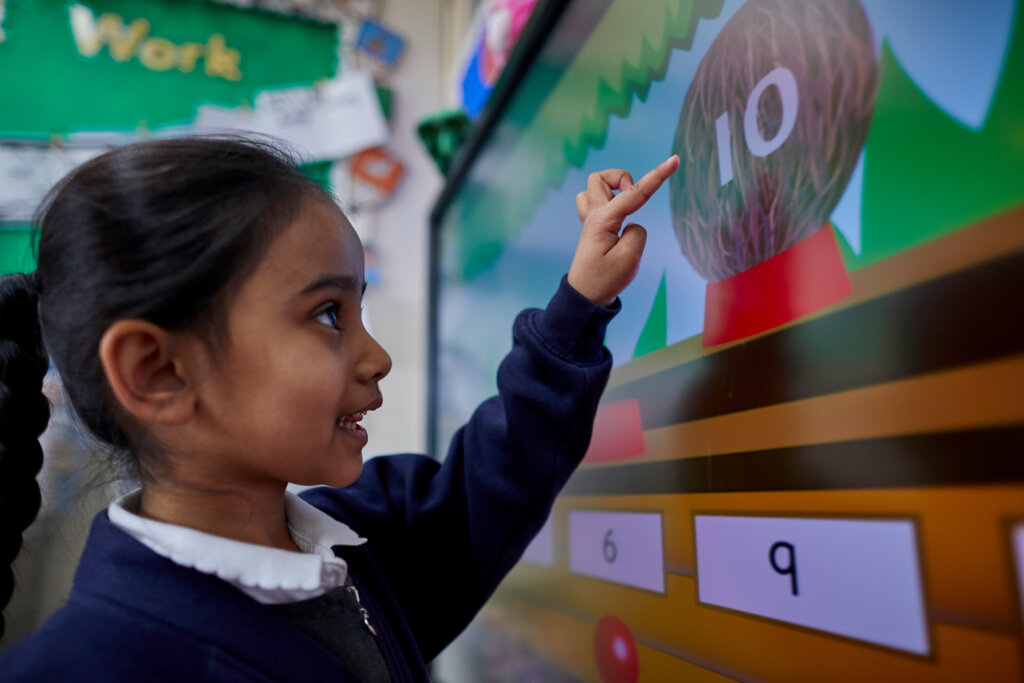We strive for all our pupils to achieve the best possible outcomes, but for those with the capacity to go beyond the expected standard, it’s crucial to provide the right kind of support to help them thrive. In this blog, we’ll explore what schools need to do to ensure that children with greater depth potential are given the tools and opportunities they need to excel in writing.
Writing standards continue to be a concern in many schools, not showing the post-pandemic rebound in data that is seen across other areas of literacy. Indeed, research by The National Literacy Trust found a rise in children leaving primary school without reaching the expected levels in writing to be 1 in 3 (31%) in 2022, as opposed to 1 in 5 (22%) in 2019. We know that pupils’ writing experiences were highly affected by their period of home-learning, not helped to progress by a lack of motivation to write. The NLT also published in their recent report – Children and young people’s writing in 2024 – that writing enjoyment levels have dropped significantly with fewer than 3 in 10 young people aged 8-18 saying that they enjoy writing in their free time.
Indeed, the basic skills in writing which are lacking for many of our pupils due to gaps in their previous learning, may be a reason why our greater depth children are not being identified and propelled towards achieving their full potential. A writer’s craft is too often hidden by an accompaniment of transcription and grammar errors, which often influence teacher assessment too greatly. Pupils who have the potential to be greater depth, who use authorial techniques and begin to show the metacognition of a writer are therefore not nurtured and go under the writing radar.
This is of huge concern when attempting to achieve good and accurate writing outcomes. It indicates a need to support teachers to identify potential greater depth writers from an early stage so that we can motivate them and help develop their writing identity from the outset. We understand from previous research that there is a clear link between writing for enjoyment and writing attainment, something we believe as educators to be vital. This was also proven by the UKLA’s Teaching writing effectively: Reviewing Practice study which found that giving pupils choice, ownership and a deeper understanding of why they wrote had a positive impact on their writing outcomes.

The Hayes and Flower’s Model of Composition (1980)
This cognitive perspective on the writing process model shows that the individual and their writing are characterised by the writer’s cognitive processes, motivation, working memory and long-term memory. The writer’s motivation is subdivided into goals for writing, their predispositions, beliefs and attitudes and the costs/benefits where writers will weigh up what the benefits are for them doing the writing in the first place. This identifies there is quite a criterion to address when ensuring the motivation of a mixed-ability class. Greater Depth writers’ writing dispositions are developing from the outset and to create a writing affection in them will put them on the right path. If we secure motivation from pupils and teach them well, then we will see their writing craft improve.
We can therefore see that it is paramount to ensure our writing curriculum is relevant, diverse and does not ceiling outcomes. Many schools wrongly assume that greater depth writers need the same teaching and learning as the whole, but will perform more highly through their own volition. While this is in part true, strong writers need this and more. Enabling greater depth writers needs to be managed well through effective leadership of Literacy, staff training to ensure knowledgeable, progressive teaching and assessment-informed planning and monitoring.
Assessment and Monitoring
Pupils who achieve greater depth might not have started out being the most technically accurate writers, however this is often the children who are identified as being higher-level writers within a cohort. Identifying those children with potential for greater depth at an early stage by dispelling this myth with teachers is key for enabling their progress effectively. Often, children who write well are high-achievers, enjoy reading and are interested in learning. They spell well and write clearly, composing a range of text types effectively because they apply the sentence structures taught in class and tick off the objectives. Grammar, spelling and punctuation errors can be taught and picked up if they are lacking; what we want to focus on are those pupils who write interesting and creative pieces. These are the pupils to be trained on authorial technique, style and structure and whom could be further supported through interventions to build on their strengths as a writer.
It is clear that achieving greater depth is exactly the higher-level skill that we know it to be; one that requires investment in planning, staff CPD and tailored support. We know it to be possible, although perhaps not easy, to enable more greater depth writers to become fully-fledged with these foundations in place in schools.
Effective Long-Term Planning
Planning for writing must provide options for our Greater Depth pupils. Whole-school writing planning must ensure not only coverage of text types, repetition and progression in content in line with the NC objectives, but to also be tailored to the pupils themselves, the school’s context, community links and diversity. Coverage to enhance greater depth skills includes using a range of high-quality texts to model authorial technique, relate to the children themselves and to inspire.
When adapting writing outcomes for pupils, we can consider alternatives for greater depth writers that challenge their independence in technique. In this Year 1 example, the pupils are encouraged to write from a different character’s perspective or to develop the character’s voice. This leaves the pupil open to much more choice and interpretation of the outcome, allowing them to create in their own style.

This next example of a Y6 writing unit encourages the greater depth pupils to adapt the text type to their own preference. The pupils may need to adapt the other elements of the RAFT to suit their revised outcome, creating the language effects desired of the reader.

Teachers may manage the range of outcomes in their classes by holding ‘writing conference conversations’ within the lesson, to feedback on pupils’ progress, content and to model technique.
Working with teachers to identify these adaptations to planning to enable greater depth writers to be given more choice and volition will widen the field of their writing experiences. Moreover, it will encourage opportunities for teachers to deepen the authorial content that is taught through the text diversity. It is vital to regularly review and adapt the school’s long-term plan to ensure new authors are experienced, the modern world is represented and pupils are exposed to writing for causes that are important and that they care about.
Writing for Real Reasons
Giving budding authors a real reason to write for a real audience and purpose is extremely valuable in inspiring young writers, not only for the enhancement of their life experience but also to spark the passion that we see in professional authors who have chosen to share their message with the world. Greater depth writers will almost always be those who enjoy writing – for whom it becomes a passion. This is only gained through experimentation, interest and dedication in crafting their writing, sparked from seeing the influence it can bring to others. Whether it to be to entertain, inform or persuade, there is always a link that can be found to the real world. Consider traditional tales that have been told for generations- they have a purpose, a role in teaching the young; or the example of a persuasive battle cry that might be made before standing for a cause. In non-fiction, pupils might formulate an explanation of the plight of refugees to inform younger pupils. A task such as this where pupils are invested in the topic and have accountability for the outcome will reap a much higher standard of writing. It is worth spending time refreshing your writing ideas across the school to ensure links are made, knowledge is built upon and real life is represented – be it through the eyes of a character or from the child’s own perspective.
Teaching the Craft of Writing
To support all pupils, but especially those with greater depth potential, we need to model to them how important their choices are as authors. Teaching children the craft of writing requires a teacher who has this knowledge and skill themselves. The benefit of being shown how to adapt word choices for impact, how to manipulate the structure of the text and to evaluate and monitor their own writing is essential to write as an author beyond their expected level. Through ongoing study within reading and writing lessons, the vast range of ways to affect their reader will be polished and crafted if taught well across the school.
Effective oracy also plays a vital part in securing greater depth teaching for writing. Pupils become ‘word conscious’, aware of their important role in compiling the text to impact their specific reader.
Having the discussions around how authors manipulate language as a model, leads to effective analysis of their own writing with peers and consequently hones their craft. This is often part of the teaching process which is excluded. Editing and revising is a key element to improving the understanding of how to perfect one’s writing and is effectively taught through prompts and models.
To support you further in this area, we have created a free writing reflection resource to develop the pupils’ self-reflection of their writing choices. Spending time considering why they have made particular writing choices will support children’s advancement of their independent writing skills and the understanding of authorial technique.
Further Training
To find out more about how to support staff to enable pupils to achieve the greater depth writing standard, book into our training session: Greater Depth Writing: A Whole School Approach on 3rd April at The Nest in Manchester. This session will look at how to re-evaluate the writing curriculum to ensure it meets the needs of writers who have the potential to achieve at greater depth and will unpick best practice in identifying greater depth writers and whole school strategies to support their development over time, through whole class teaching, intervention, and accurate assessment. Delegates will leave with a range of strategies to support greater depth writing across the school, as well as resources including our greater depth assessment statements.
How One Education can help further
If you would like more bespoke support on enabling greater depth writers in your school or would like to find out more about how we could support your school’s literacy development in other areas, please contact Alice Pepper at One Education alice.pepper@oneeducation.co.uk.
Please complete the form below and we will get in contact as soon as we can to help you with your query.
















